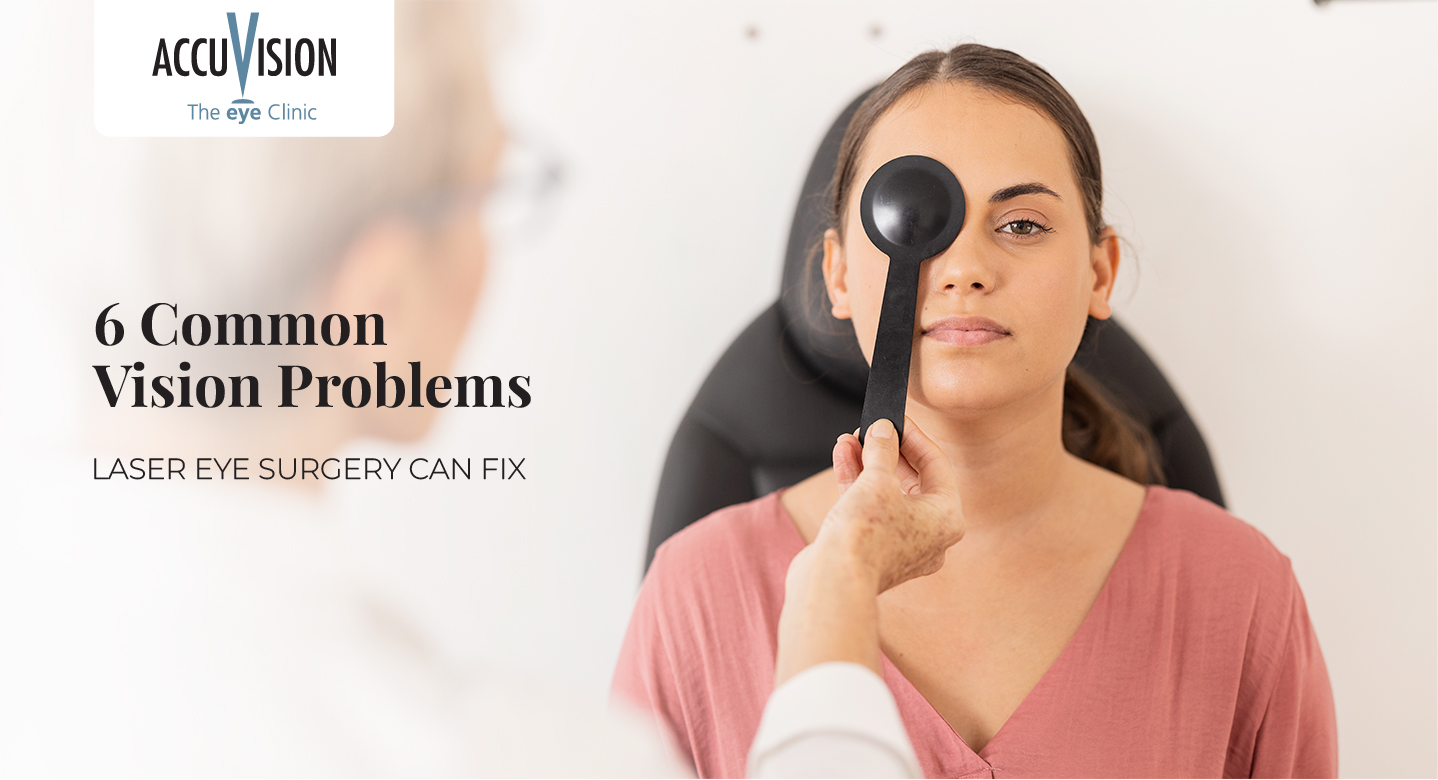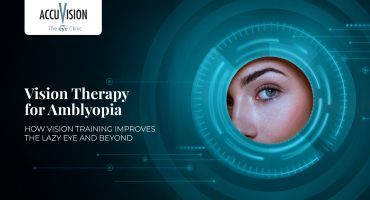- Living with corrected vision and setting expectations
- Frequently asked questions
- Summary

The eyes are complex optical systems. When light does not focus accurately on the retina, the result is usually a refractive error (prescription). Glasses and contact lenses can correct these errors by altering the path of light, but they do not change the underlying shape of the eye. Laser refractive surgery reshapes the cornea to bring the focus back to the retina.
This blog explores six vision problems that laser eye surgery can be used to address.
1. Myopia (short‑sightedness)
Myopia occurs when light from distant objects focuses in front of the retina. People with myopia typically have difficulty seeing in the distance. The condition affects roughly a third of the UK population. Myopia may be mild (up to −3 dioptres), moderate (−3 to −6 D) or high (greater than −6 D). Symptoms include blurred distance vision, squinting, headaches and eyestrain. Causes include an eyeball that is too long, a cornea that is too steep, genetics and environmental factors.
LASIK and other laser procedures can reduce myopia by flattening the cornea’s surface. The specialised technologies at AccuVision can help correct myopia up to −14 dioptres, and sometimes beyond. A review of refractive surgery found that laser techniques are effective and safe for correcting refractive errors, with high patient satisfaction. However, extremely high myopia may require custom laser or lens‑based solutions or a combination of treatments. Patients should be screened for corneal thickness and any irregularities such as keratoconus, a condition in which the cornea thins and bulges outward.
2. Hyperopia (long‑sightedness)
Hyperopia is the “opposite” of myopia; light focuses behind the retina. People with hyperopia often see distant objects clearly but struggle with near tasks such as reading or computer work. In very high hyperopia, both distance and near targets can be blurred. Symptoms include eye strain, squinting and blurred close vision. The condition may be caused by an eyeball that is too short, a cornea that is too flat or a lens that does not become round enough during accommodation. Hyperopia can sometimes coexist with astigmatism or other refractive errors.
At AccuVision, we use laser treatments to steepen the cornea’s curvature and move the focal point. Hyperopia up to +8 dioptres and sometimes higher can be corrected. As with myopia, a full evaluation of corneal thickness and eye health is necessary.
3. Astigmatism
Astigmatism usually means the cornea or lens is curved more steeply in one meridian than another, creating multiple focal points and blurred vision at all distances. It can be described as the eye being more rugby ball shaped than round. Symptoms include distorted vision, ghosting (double images), headaches and difficulty seeing at night.
Laser surgery can correct most types of corneal astigmatism by sculpting the cornea into a more regular shape. AccuVision’s advanced technology can treat astigmatism as high as 6 dioptres and can address complex irregularities that glasses and contact lenses cannot always fully correct. Studies show that treatments for combined myopic–astigmatic and hyperopic–astigmatic corrections are safe and effective. That answers the common question, does laser eye surgery fix astigmatism?-yes, in many cases it does, and in many cases with better natural quality of vision than spectacles and contact lenses.
4. Presbyopia (age‑related focus loss)
Unlike myopia, hyperopia and astigmatism, presbyopia is not a refractive error caused by corneal shape. It is an age‑related loss of the eye’s ability to change focus because the crystalline lens becomes less flexible. People typically notice presbyopia in their forties; they hold books farther away or use reading glasses. Although laser surgery cannot restore lens flexibility, it can help by creating monovision or blended vision. In monovision, one eye is corrected for distance and the other for near tasks, a blended solution that restores range of focus, helping to gain spectacle independence for day to day. AccuVision offers this option and discusses it during consultation. Patient selection and adaptability is key and detailed trials and testing help ensure the right solution is recommended for each individual.
5. Mixed or compound astigmatism
This type of astigmatism means one part of your eye focuses light like a nearsighted eye, while another acts like a farsighted eye. The result? Blurred and distorted vision at all distances. Advanced laser mixed astigmatism treatments, such as wavefront-guided correction, can precisely reshape the cornea to give you clear, sharp vision.
6. Higher‑order aberrations and night‑vision problems
Traditional glasses correct lower‑order aberrations (spherical error and astigmatism), but they do not address higher‑order aberrations. These can cause glare, halos and reduced contrast, especially at night. Wavefront customised laser surgery can help map these subtle imperfections and can reduce them, leading to crisper vision. While no surgery eliminates all aberrations, many patients report fewer night‑vision disturbances after customised treatments.
Living with corrected vision and setting expectations
Beyond the technical details of what laser surgery can fix, it’s helpful to consider how your day‑to‑day life might change. Many patients describe the joy of waking up and seeing clearly without fumbling for glasses. Sports and outdoor activities become easier without the fear of losing a contact lens or breaking spectacles. Driving at night often feels more comfortable once higher‑order aberrations are reduced. Peer‑reviewed research notes that laser surgery aims to reduce or eliminate the need for corrective lenses, and many LASIK patients report greater satisfaction than contact lens wearers. At the same time, realistic expectations are crucial. You may still need reading glasses in later life because natural change affects everyone. Some patients experience temporary dryness or light sensitivity as the eyes heal. Following your surgeon’s instructions about eye drops, rest and avoiding water exposure will support healing.
It’s also important to remember that laser surgery does not treat all ocular problems. Conditions like cataracts, glaucoma or retinal diseases require different interventions. Keratoconus, a progressive thinning of the cornea, is generally a contraindication to LASIK, though corneal cross‑linking with combined surface laser treatments can be used to help stabilise the cornea and improve vision. If you have significant clinical dry eye, autoimmune disease or are pregnant, your surgeon may advise delaying or avoiding surgery, or implementing specific pre and post operative care to minimise risk where there are other general health conditions. A thorough consultation will determine whether you are a good candidate.
Frequently asked questions
What does laser eye surgery correct?
Laser surgery primarily corrects refractive errors, such as myopia, hyperopia, astigmatism and presbyopia (reading glasses) by reshaping the cornea.
Is everyone a candidate for laser surgery?
No. Contraindications for certain types of laser surgery like LASIK include keratoconus (a progressive thinning of the cornea), uncontrolled autoimmune or systemic diseases, pregnancy, unstable prescriptions and some other eye conditions. A thorough assessment will determine eligibility and help design a customised treatment plan.
Will surgery eliminate glasses completely?
Many patients achieve complete spectacle independence, but no surgery can produce a visual outcome that changes with us, and so some small natural change over the years is inevitable. Enhancement procedures can fine‑tune results for many down the line, if needed.
How long do results last?
The corneal shape change is permanent. However, the eye may continue to change through life, especially if there are other health related factors or eye disease that develops over the years. Detailed examination and testing helps ensure you are only offered surgery if the benefits outweigh any potential risks, however rare. Regular follow‑ups ensure any change is monitored and can be treated effectively.
Are there risks?
All surgery carries risks. Potential complications can include dry eye, glare, halos, undercorrection or overcorrection. Serious complications like infection are extremely rare when specialist care and patient compliance work together. Your surgeon will discuss particular risks that relate to your care and help you implement any actions that will minimise these.
Summary
Laser eye surgery offers a powerful way to correct a variety of refractive errors. Vision problems laser eye surgery fixes include myopia, hyperopia, astigmatism, presbyopia and complex higher‑order aberrations. AccuVision’s technology enables effective treatment of high prescriptions and irregular corneal shapes. While laser surgery can deliver long‑term spectacle independence, suitability must be evaluated individually. By understanding what laser eye surgery does correct and what its limitations are, and discussing your specific needs with your Consultant, you can make an informed decision.








